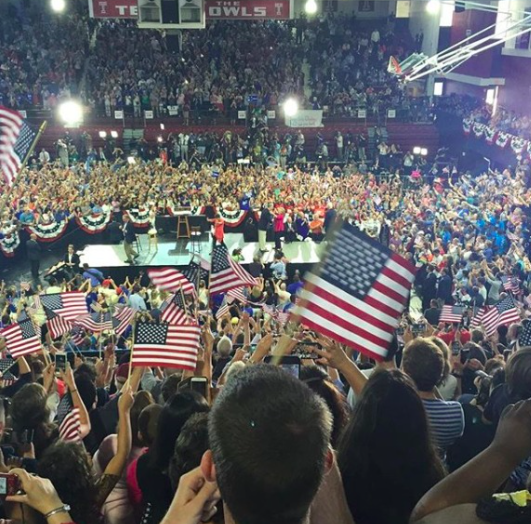The Last Election of the Sixties

It may be 2016, but as the final night of the Democratic convention made clear, this election will be the last of the 1960s. Both parties are deeply rooted in the cultural conflicts and transformations of the Sixties — and the side of that decade that prevails in November will say a lot about where we go as a nation in the years ahead.
Just walking into the two conventions was a jolt of cultural symbolism — the almost all-white GOP gathering versus the remarkably rainbow diversity of the Democrats, and the rifle bearing open carry men demonstrating their masculinity and power outside the Cleveland arena versus the ratification of LGBT equality in Philadelphia.
But more important is what these parties have come to represent. For Democrats, America is a nation conquering its bigoted demons of old, a nation that is advancing what the Sixties liberation movements started. Think back to an era before the Sixties when African Americans straightened their hair with a mixture of lye, potato, and egg that burned fiery sores in their scalp, or when they bought skin whitener called “Black No More.” Or when classified ads told women they were qualified for the job if they were attractive and 5’5″ to 5’7″ in heels. Or when gays and lesbians pretended to be something they weren’t, or when Jews bought Christmas trees and changed their names to stay inconspicuous.
We still have plenty of progress to make, Democrats say, but the very fact that we have buried the old ways and are internalizing and indeed living the new — this next generation in particular — is cause for celebration and pride. The Sixties were all about changing norms, about egalitarian values, about respecting individuality, about everyone having an equal seat at the table where no one is left outside with their noses pressed to the glass simply because they look, act, or live differently from the mainstream. Even today the one main Sixties-style activist movement, Black Lives Matter, is no different from what the movements of that decade were all about — being treated with dignity. And giving it a platform at the Democratic convention was fully in keeping with the convention’s Sixties spirit.
And thus Democrats had an answer for Donald Trump — that our nation is great and greater than ever because we have become a more open, inclusive, free, and equal society than at any time in our history. So the angry party that protested against an outmoded and discriminatory society in the Sixties is now the sunny party celebrating what we have accomplished and what we have become. The culture wars are over, Democrats are saying, and the Sixties have won.
Not so fast, says the GOP of Donald Trump. America is being undermined by this emphasis on diversity, by elites that want to impose a politically correct culture on traditional Americans who believe that Black Lives Matter activists show no respect, that gay advocacy undermines our families and faith, that immigrants are interlopers, and Muslims pose an existential threat. To them, it was their stiff backbones, sturdy hands, and lunch pail jobs that built America, and the fact that liberals and minorities show them no deference and in fact label them as bigots is infuriating.
Now this of course is nothing new. It may wear different clothing, but it’s exactly what Richard Nixon tapped into during the 1960s when he appealed to an increasingly aggrieved and resentful Silent Majority — a Donald Trump term as well — and campaigned against elites that impose “quotas” which demonize whites to privilege minorities.
Back in 1964 the great journalist Theodore White wrote what may be the most prescient piece of that decade about the roiling white middle-class resistance to racial integration. “Backlash,” he called it, and he described it as an “unease whose impact will be felt not as much now as over the long range,” one that would force the Republican Party, “born in racial strife, to choose whether it abandons its tradition and becomes the white man’s party or refreshes its tradition by designing a program of social harmony.”
Donald Trump may not represent the entire GOP, but from the look and feel of the Republican convention, Theodore White got it right 52 years ago. The Trump constituency wants its America back, and this may be the last election in which the backlash that began in the Sixties will have an opportunity to win.
The Sixties are long over. Long live the Sixties.